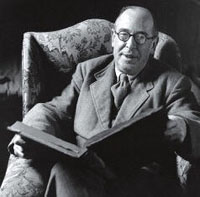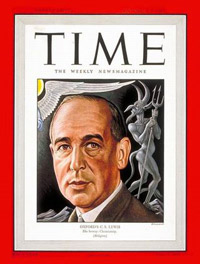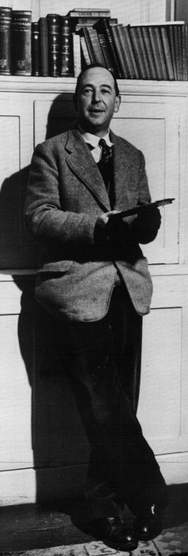March
2011 - Vol. 48
.

.
Repentance,
Forgivensss,
Heaven,
and Hell
quotes
from C.S. Lewis
.
Repentance.What
was the sort of 'hole' man had got himself into? He had tried to set up
on his own, to behave as if he belonged to himself. In other words, fallen
man is not simply an imperfect creature who needs improvement: he is a
rebel who must lay down his arms. Laying down your arms, surrendering,
saying you are sorry, realizing that you have been on the wrong track and
getting ready to start life over again from the ground floor
that
is the only way out of our 'hole'.
This process of surrender this
movement full speed astern is
what Christians call repentance. Now repentance is no fun at all. It is
something much harder than merely eating humble pie. It means unlearning
all the self-conceit and self-will that we have been training ourselves
into for thousands of years. It means killing part of yourself, undergoing
a kind of death. In fact, it needs a good man to repent. And here comes
the catch. Only a bad person needs to repent: only a good person can repent
perfectly. The worse you are the more you need it and the less you can
do it. The only person who could do it perfectly would be a perfect person
and
he would not need it.
[quote from Mere Christianity,
by C.S. Lewis. The book was adapted from a series of BBC radio talks made
between 1941 and 1944, while Lewis was at Oxford during World War II. Considered
a classic of Christian apologetics, the transcripts of the broadcasts originally
appeared in print as three separate pamphlets: The Case for Christianity
(1942), Christian Behaviour (1942), and Beyond Personality (1944).
It was originally published as a single book in 1943 by Macmilan Publisher
in New York, and in 1944 by Collins in London.]
Forgiving versus
Excusing. I find that when I think I am asking God to
forgive me I am often in reality (unless I watch myself very carefully)
asking him to do something quite different. I am asking him not to forgive
me but to excuse me. But there is all the difference in the world between
forgiving and excusing. Forgiveness says "Yes, you have done this thing,
but I accept your apology; I will never hold it against you and everything
between us two will be exactly as it was before." But excusing says "I
see that you couldn't help it or didn't mean it; you weren't really to
blame." If one was not really to blame then there is nothing to forgive.
In that sense forgiveness and excusing are almost opposites....
When it comes to the question of our forgiving other people, it is partly
the same and partly different. It is the same because, here also, forgiving
does not mean excusing. Many people seem to think it does. They think that
if you ask them to forgive someone who has cheated or bullied them you
are trying to make out that that there was really no cheating or no bullying.
But if that were so, there would be nothing to forgive. They keep on replying,
"But I tell you the man broke a most solemn promise." Exactly: that is
precisely what you have to forgive. (This doesn't mean that you must necessarily
believe his next promise. It does mean that you must make every effort
to kill every taste of resentment in your own heart
every
wish to humiliate or hurt him or to pay him out.) The difference between
this situation and the one in which you are asking God's forgiveness is
this. In our own case we accept excuses too easily; in other people's we
do not accept them easily enough.
[quote from The Weight
of Glory, by C.S. Lewis. Lewis delivered this sermon at Oxford University
Church of St. Mary the Virgin, on June 8, 1941. It was originally published
in 1942 by G. Bles in London and by Macmilan Co., New York.]
Heaven and Hell.
God will look to every soul like its first love because he is its first
love. Your place in heaven will seem to be made for you and you alone,
because you were made for it made for it stitch by stitch as a glove
is made for a hand.
It is from this point of view that
we can understand hell in its aspect of privation. All your life an unattainable
ecstasy has hovered just beyond the grasp of your consciousness. The day
is coming when you will wake to find, beyond all hope, that you have attained
it, or else, that it was within your reach and you have lost it forever.
[quote from The
Problem of Pain, by C.S. Lewis. This book was originally published
in 1940 by the Centenary Press, London, and by Macmilan Co., New York.] |

Clive Staples Lewis
(November 29, 1898 November 22, 1963), commonly referred to as C. S.
Lewis and known to his friends and family as Jack, was an Irish-born British
novelist, academic, medievalist, literary critic, essayist, lay theologian
and Christian apologist. He is also known for his fiction, especially The
Screwtape Letters, The Chronicles of Narnia and The Space Trilogy.
Lewis
was a close friend of J. R. R. Tolkien, and both authors were leading figures
in the English faculty at Oxford University and in the informal Oxford
literary group known as the "Inklings". According to his memoir Surprised
by Joy, Lewis had been baptised in the Church of Ireland at birth,
but fell away from his faith during his adolescence. Owing to the influence
of Tolkien and other friends, at the age of 32 Lewis returned to Christianity,
becoming "a very ordinary layman of the Church of England". His conversion
had a profound effect on his work, and his wartime radio broadcasts on
the subject of Christianity brought him wide acclaim.

C. S.
Lewis was featured on the cover of Time, September 8, 1947. The article
about him was titled, His heresy: Christianity.

Portrait
of C.S. Lewis by Arthur P. Strong, 1947
|